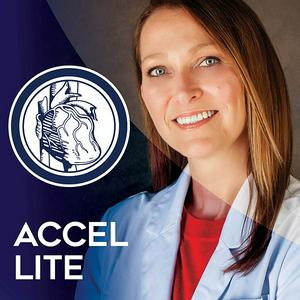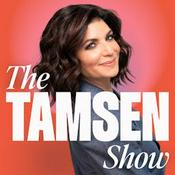ACCEL Lite: Featured ACCEL Interviews on Exciting CV Research
American College of Cardiology

Latest episode
321 episodes
VESALIUS-CV Trial: Effect of Evolocumab in Patients at CV Risk without Prior MI or Stroke
2026/2/10 | 9 mins.The VESALIUS‑CV trial demonstrated that adding the PCSK9 inhibitor evolocumab to optimized lipid‑lowering therapy significantly reduced the risk of first major cardiovascular events by 25% in high‑risk adults without prior heart attack or stroke and cut the risk of first heart attack by 36%. These results confirm that intensive LDL‑C lowering with evolocumab provides meaningful primary‑prevention benefits in patients with atherosclerosis or diabetes, achieving substantial event reduction over more than four years of follow‑up.
In this interview, Nanette Kass Wenger MD, MACC and Erin A. Bohula, MD, FACC discuss the VESALIUS-CV Trial: Effect of Evolocumab in Patients at CV Risk without Prior MI or Stroke.- Is the evidence convincing that intensive antihypertensive therapy protects brain function and helps prevent dementia? Research increasingly shows that high mid‑life blood pressure is a strong predictor of later cognitive decline. Emerging data further indicate that intensive blood‑pressure lowering can reduce the risk of cognitive impairment and dementia while remaining safe for many older adults.
In this interview, Glenn A. Hirsch MD, MHS, FACC and Paul K Whelton, MB, MD, MSc discuss "Hypertension Treatment Trials in the Elderly for Brain Health". - In patients with Type 2 diabetes and established atherosclerotic cardiovascular disease (ASCVD), tirzepatide was non‑inferior to dulaglutide for major cardiovascular events while providing superior kidney protection, lower all‑cause mortality, and greater reductions in HbA1c and body weight. Compared with dulaglutide, a GLP‑1 receptor agonist, tirzepatide demonstrated broader metabolic and clinical benefits. By using dulaglutide as the active comparator rather than a placebo, the trial demonstrated tirzepatide's strong cardiovascular and metabolic profile, supporting its potential for broader use beyond diabetes management.
In this interview, Dipti Itchhaporia MD, MACC and Stephen Nicholls, MBBS, PhD, FACC discuss the SURPASS-CVOT Trial (Effect of Tirzepatide Versus Dulaglutide on Major Adverse Cardiovascular Events). CAUGHT-CAD: Combining Coronary Calcium Score with Treatment on Plaque Progression in Familial CAD
2026/1/20 | 10 mins.Coronary artery calcium (CAC) scoring provides important prognostic value, particularly for individuals at intermediate risk for coronary artery disease (CAD) or those with a family history of the condition. Incorporating computed tomography calcium scoring into a structured disease‑management program may help prevent the progression of coronary plaque, although this strategy has not yet been evaluated in a randomized trial.
In this interview, Allen J. Taylor, MD, FACC and Dr Nitesh Nerlekar, MBBS, PHD discuss the CAUGHT-CAD Randomized Trial: Effects of Combining Coronary Calcium Score with Treatment on Plaque Progression in Familial CAD".AI-Enabled Nationwide Opportunistic Screening of Non-Contrast Chest CT for Death and CV Outcomes
2026/1/13 | 10 mins.AI technology transforms routine chest computed tomography (CT) scans by precisely quantifying—rather than simply detecting—key cardiovascular imaging risk factors such as heart calcification, aorta calcification, and fat around the heart. By shifting from binary "yes or no" findings to actual measurement, clinicians can more accurately identify high‑risk patients and intervene earlier to help prevent heart attacks and strokes. Patients with these imaging risk factors who were already using preventive therapies like statins and aspirin showed lower cardiovascular risk, suggesting the need for larger longitudinal studies to clarify how quantified imaging markers interact with these medications over time.
In this interview, Deepak L. Bhatt MD, FACC and Tzung-Dau Wang, MD, PhD discuss "AI-Enabled Nationwide Opportunistic Screening of Non-Contrast Chest CT for Death and CV Outcomes".
More Education podcasts
Trending Education podcasts
About ACCEL Lite: Featured ACCEL Interviews on Exciting CV Research
The American College of Cardiology offers select interviews and summaries of cardiology's most interesting research areas from ACCEL's renowned library, hosted by ACCEL Editor-in-Chief Alison L. Bailey, MD, FACC, FAACPVR.
Podcast websiteListen to ACCEL Lite: Featured ACCEL Interviews on Exciting CV Research, JIM ROHN and many other podcasts from around the world with the radio.net app

Get the free radio.net app
- Stations and podcasts to bookmark
- Stream via Wi-Fi or Bluetooth
- Supports Carplay & Android Auto
- Many other app features
Get the free radio.net app
- Stations and podcasts to bookmark
- Stream via Wi-Fi or Bluetooth
- Supports Carplay & Android Auto
- Many other app features


ACCEL Lite: Featured ACCEL Interviews on Exciting CV Research
Scan code,
download the app,
start listening.
download the app,
start listening.






































